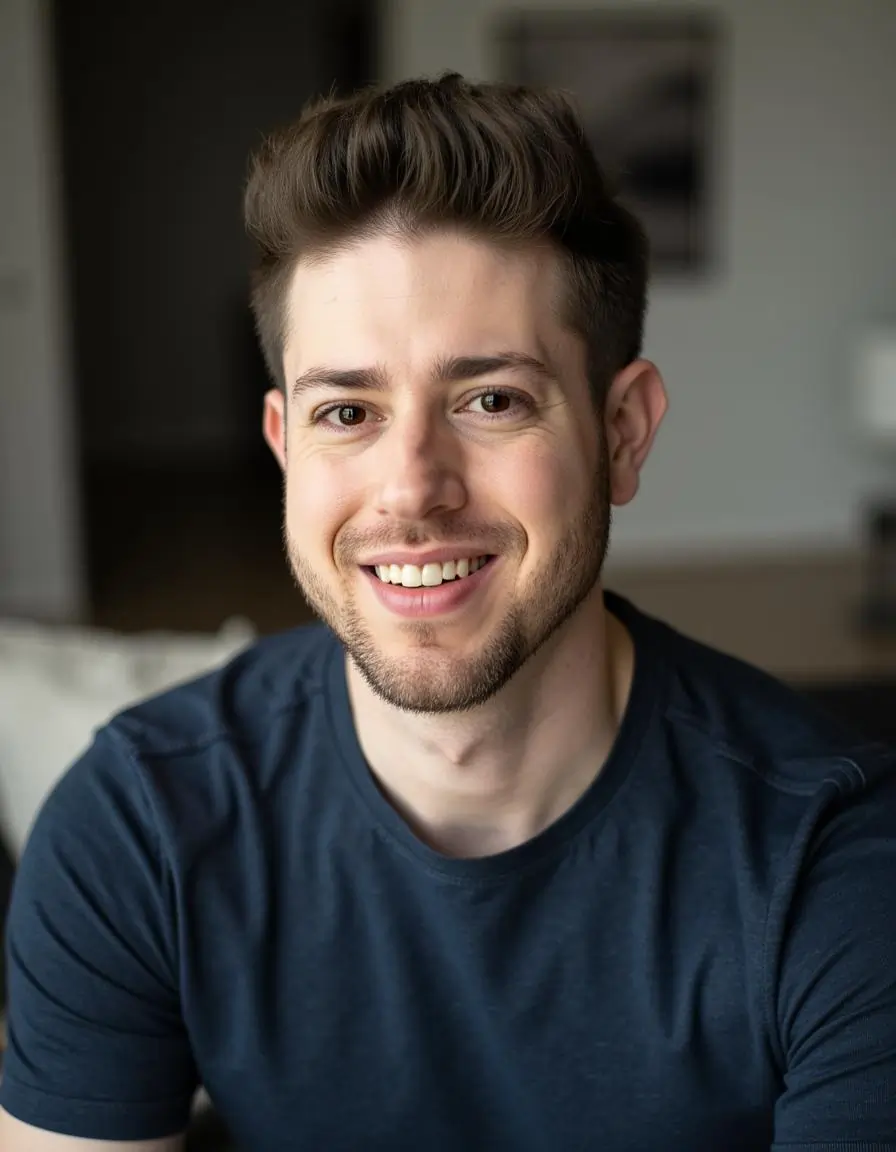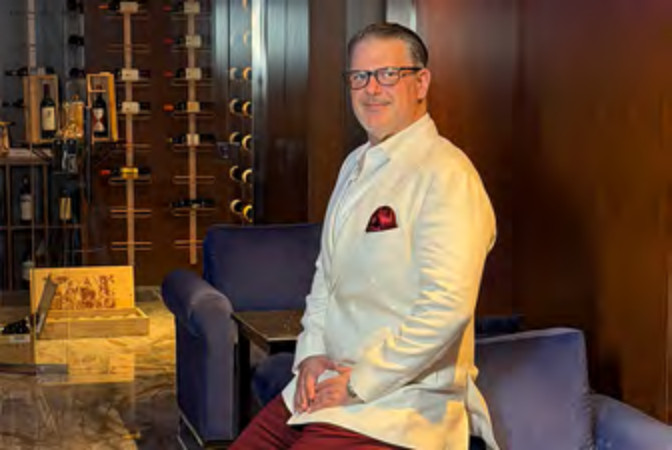
Jayson Robert Pocius brings a thoughtful mix of experience to his work in real estate and design. He grew up in Chicago, Illinois, where the Bulls’ dominance in the ‘90s made basketball more than a pastime. That early love of the game later brought him back to his alma mater, Roosevelt University, where he worked with student-athletes as the Special Assistant to the Head Coach for the men’s basketball team.
Between 2008 and 2011, Pocius earned his Bachelor’s in Business Administration at Roosevelt, then went on to complete his MBA at Loyola University Chicago in 2015. After school, he immediately got involved in real estate, starting several LLCs for rental properties around Chicago. He learned the ropes through trial, error, and plenty of hands-on work, paying close attention to how properties functioned, how neighborhoods evolved, and how to find opportunity in the small details.
Today, Pocius is based in Las Vegas, where he runs DONTBECHI Designs, a design-forward real estate firm. His design approach blends aesthetics with functionality, reflecting his belief that every space should serve both its occupants and the surrounding community.
Outside of work, he stays connected with the activities and interests that have long shaped his life. He’s a lifelong fan of college basketball and still plays beach volleyball, a sport he picked up during the warm summers in Chicago. Through every stage of his career, Pocius has been guided by curiosity and a steady sense of direction, which continues to take him far.
We recently had the opportunity to connect with Jayson Robert Pocius about the people who’ve influenced his work, the values behind DONTBECHI Designs, and what’s next for him and the business.
Who has played the most influential role in shaping your vision for DONTBECHI, and what key lessons did you take from them?
The most influential person has been Hasani Steele (Steele Consulting Group), a seasoned developer I worked with in my early years in real estate development in Chicago. He taught me the importance of blending aesthetics with function, ensuring that every project serves not only its occupants but also enhances the community. One of the key lessons I took from Hasani is that the design of a space must tell a story and have an emotional connection with its users, all while maintaining sustainability and long-term viability. This has shaped the foundation of DONTBECHI Designs as a firm that focuses on design excellence while fostering a deep commitment to community-focused developments.
As the founder of a design-focused development firm, how do you approach mentoring newer professionals or creatives in real estate and design?
I believe in leading by example and creating an open, collaborative environment where newer professionals can see the design and development process in action. I encourage them to take ownership of their work while also providing the space for them to experiment and grow creatively. One of my approaches is to share both the successes and failures of past projects, helping them understand the real-world implications of their decisions. Additionally, I emphasize the importance of resilience and adaptability, which are key traits for anyone in the ever-evolving design and development industry.
Was there a single piece of advice or a turning point that helped refine your career focus from finance and land acquisition to launching your own firm?
The turning point for me was a conversation I had with Hasani Steele (Steele Consulting Group), who told me that success in development isn't just about the numbers. It's about creating something that leaves a lasting impact on a community. That conversation made me realize that my true passion lay in the design and transformation of spaces, not just in acquiring land or maximizing profit margins. This advice helped me shift my focus to establishing my own firm where I could blend design with real estate development, allowing me to have a more personal stake in the process of community revitalization.
What’s your approach to maintaining meaningful relationships with mentors and peers as you continue growing DONTBECHI?
I make it a priority to stay engaged with my mentors and peers through regular check-ins, whether it’s over a casual lunch, a phone call, or collaborating on specific projects. I believe in the value of reciprocal relationships. It's not just about seeking guidance but also about offering help and insights when possible. Maintaining these connections is important for continued growth, both personally and professionally, as it keeps me grounded and connected to the broader industry.
When looking for guidance or collaboration, what qualities matter most to you in a mentor or advisor?
When seeking guidance, I look for mentors who possess experience, integrity, and a passion for innovation. I want to work with people who have a deep understanding of the industry but are also forward-thinking and open to new ideas. It’s important to me that they can challenge my thinking and provide constructive feedback, helping me grow without being overly prescriptive. Authenticity and a genuine desire to help others succeed are qualities I value most in any mentor or advisor.
How has your own style of leadership and mentoring evolved since starting DONTBECHI?
When I first started DONTBECHI Designs, I took a hands-on approach to every aspect of the business, trying to oversee everything. Over time, I learned to trust my team and let them lead in their areas of expertise. My leadership style has evolved to be more about empowering others, providing them with the tools, resources, and support they need to succeed. As a mentor, I focus more on facilitating growth rather than directing every decision, giving them space to develop their own leadership abilities.
In what ways has mentorship contributed to your growth, not just professionally, but in how you approach neighborhood revitalization and sustainable development?
Mentorship has broadened my perspective on revitalization and sustainability. Through guidance from mentors in architecture, urban planning, or social development, I’ve learned to design for long-term community needs, not just short-term financial gains. I’ve also come to understand the delicate balance between innovation and preservation and how to incorporate sustainable practices into development projects while still honoring the cultural and historical fabric of a neighborhood.
When building your team or working with collaborators, how do you identify someone with potential, and what do you do to support their development?
When looking for collaborators or team members, I focus on their passion for design, ability to think critically, and openness to learning. I look for individuals who are not afraid to challenge the status quo and bring fresh ideas to the table. Once I’ve identified someone with potential, I provide opportunities for them to take on responsibility, encourage them to explore new aspects of the design and development process, and ensure they have access to continuous learning, whether through formal training, networking, or hands-on experience.
What do you find most rewarding about mentoring or guiding others who want to enter the design and development space?
The most rewarding part is seeing someone grow and find their own path and watching them creatively and confidently apply the lessons I’ve shared to their own projects. I also enjoy helping them navigate the challenges of the industry, from the complexities of zoning regulations to finding innovative design solutions. It’s about empowering them to become leaders themselves and shaping the next generation of professionals who will push the boundaries of what’s possible in real estate and design.
Do you still stay in touch with early mentors from Chicago or Las Vegas, and how do those connections continue to shape your thinking today?
Yes, I still stay in touch, both from Chicago (Hasani Steele) and Las Vegas (colleagues from KB Home). These connections are invaluable, and I find myself reaching out to them for advice when I’m facing a challenge or exploring a new direction for DONTBECHI Designs. Their insights remind me of the fundamentals of good design and development while encouraging me to think big and stay true to my vision. Their experience in navigating the complexities of the industry has been constant, and I am grateful for their continued mentorship.
Looking Ahead
As DONTBECHI Designs keeps growing, Pocius is still building—just not always with brick or blueprints. These days, he spends much of his energy pouring into other people, both through mentorship and collaboration. He remains closely involved in the design process, but he’s also focused on the process behind it—the relationships, decisions, and moments that bring a project to life. Whether he’s designing a home or supporting someone early in their career, his focus is to create long-term value.
We would like to thank Jayson Robert Pocius for sharing his time and insight with our readers.


